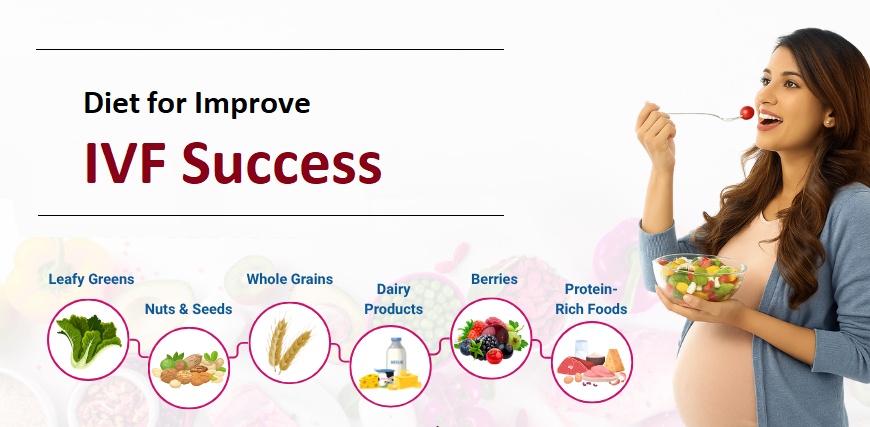- November 26, 2025
- Posted by: admin
- Categories: IVF, IVF treatment

IVF (In Vitro Fertilization) has become one of the most trusted fertility treatments in the world. Advanced medical technologies, personalised treatment plans, and deeper understanding of reproductive health have significantly improved IVF success rates. But beyond medical science, one factor still remains extremely powerful and often underrated: your diet and lifestyle.
Healthy eating habits, physical activity, stress management, and daily routines can dramatically boost your reproductive health. These factors help improve egg and sperm quality, hormonal balance, and overall body function — all of which directly impact IVF results.
Let’s dive into how adjusting your diet and lifestyle can support a smoother IVF journey.
Why Diet Matters So Much in IVF Treatments
Your diet fuels your body at the cellular level. When you’re preparing for IVF treatment, your body goes through a series of hormonal changes and medical procedures. A nutrient-rich diet can help your reproductive system respond better to treatments.
How diet affects IVF success:
- Supports hormonal balance
- Boosts egg and sperm quality
- Reduces inflammation
- Improves uterine lining
- Enhances embryo implantation
- Increases overall energy levels and reduces fatigue
Fertility specialists recommend a more personalized nutrition approach, focusing on your hormonal profile, medical history, and body type. However, certain foods and patterns remain beneficial for almost everyone.
Fertility-Friendly Diet for IVF Success
a) Emphasis on Whole, Natural Foods
Fertility nutrition focuses on unprocessed, nutrient-dense foods, such as:
- Leafy greens
- Whole grains
- Fresh fruits
- Nuts and seeds
- Lean proteins
- Healthy fats like olive oil, avocado, and flaxseed
These foods improve cell health, regulate hormones, and support egg development.
b) Foods Rich in Antioxidants
Oxidative stress is one of the leading causes of poor egg and sperm quality. Antioxidants fight free radicals and protect reproductive cells.
Top antioxidant-rich foods:
- Berries (blueberries, strawberries, raspberries)
- Dark leafy greens
- Tomatoes
- Broccoli
- Walnuts
- Kidney beans
c) Foods That Balance Hormones
Your hormones play the biggest role in IVF. Certain foods can naturally support hormonal production and regulation.
- Omega-3-rich foods (salmon, chia seeds, walnuts)
- Complex carbs (quinoa, oats, brown rice)
- Healthy fats
- High-fibre vegetables
These help regulate insulin levels, improve menstrual cycles, and support the growth of healthy eggs.
d) Protein Intake: A Major Focus
New studies highlight the importance of protein — especially plant-based protein — for IVF success.
Include:
- Lentils
- Beans
- Tofu
- Paneer
- Eggs
- Lean meat
Protein supports cell repair, hormone production, and embryo development.
e) Supplements for IVF Diet (Only After Doctor Approval)
Some commonly recommended supplements include:
- Prenatal vitamins
- Folic acid
- CoQ10
- Omega-3
- Vitamin D
- Myo-inositol
- Iron (if deficient)
Never start supplements without medical guidance during your IVF journey.
-
Lifestyle Habits That Boost IVF Success
Diet alone isn’t enough. Your lifestyle plays an equally important role. Small, consistent habits can lead to major improvements in your reproductive health.
a) Maintain a Healthy Weight
Both underweight and overweight conditions can affect IVF outcomes.
- Excess fat can disrupt hormone levels
- Underweight bodies may struggle to produce healthy eggs
A balanced diet + 30 minutes of daily activity helps achieve a healthy BMI.
b) Exercise: Move, Don’t Overdo
Exercise improves blood flow, reduces stress, and maintains weight — all essential for IVF.
Recommended activities:
- Walking
- Yoga
- Pilates
- Light strength training
- Swimming
Avoid:
- High-intensity workouts
- Heavy weightlifting
- Sudden intense routines
Moderation is key.
c) Manage Stress (The Silent IVF Blocker)
Stress is one of the most overlooked factors in IVF. High stress releases cortisol, which disturbs reproductive hormones.
Best stress-relief methods:
- Meditation
- Deep breathing
- Mindfulness apps
- IVF counselling sessions
- Journaling
- Light hobbies: painting, gardening, music
Studies show that women who practice mindfulness have lower stress levels and better IVF response.
d) Improve Sleep Quality
A minimum of 7–8 hours of sleep boosts hormonal balance and supports embryo implantation.
Tips for better sleep:
- Keep a fixed sleep schedule
- Avoid screen time 1 hour before bed
- Try calming herbal teas (chamomile, lavender)
- Use dim lighting
e) Avoid Smoking, Alcohol & Excess Caffeine
These substances reduce egg quality, damage sperm, and affect embryo development.
Fertility specialists strongly recommend:
- 0% smoking
- No alcohol during IVF
- Maximum 1 cup of coffee/day
-
Partner’s Role: Diet & Lifestyle for Male Fertility
IVF success depends on both partners. Male fertility awareness is growing, and lifestyle improvements can significantly enhance sperm quality.
Men should focus on:
- High-protein diet
- Zinc-rich foods (pumpkin seeds, eggs, seafood)
- Vitamin C & E
- Omega-3
- Regular exercise
- Stress control
- Avoiding heat exposure near the groin (tight clothes, laptops on lap, saunas)
These habits boost sperm count, motility, and morphology — essential for successful fertilization.
-
Hydration — The Most Underrated Fertility Booster
Staying hydrated:
- Supports hormone transport
- Improves cervical mucus
- Detoxifies the body
- Helps regulate temperature
- Maintains blood flow to reproductive organs
Drink at least:
- 2.5–3.5 litres/day (women)
- 3–4 litres/day (men)
Include:
- Coconut water
- Lemon water
- Herbal infusions
- Detox drinks (fruits + mint + cucumber)
- Personalized IVF Diet & Lifestyle Plans
Advanced medical trends:
- DNA-based diet planning
- Gut-health-based diet recommendations
- AI-driven fertility lifestyle coaching
- Custom supplement plans
- Mental-wellness programs for IVF patients
These help create a more holistic and customized approach for each individual.
-
Emotional Well-Being: The Heart of IVF Success
IVF may feel overwhelming at times. It is emotionally, physically, and financially challenging. That’s why emotional balance is crucial.
You can try:
- Couples’ counselling
- IVF support groups
- Talking to your partner
- Positive affirmations
- Gratitude journaling
- Mental wellness apps
A positive and calm mind signals your body to function better — improving IVF outcomes.
Conclusion: Small Changes, Big Impact on IVF Success
While IVF technology continues to advance, your daily lifestyle and dietary choices still remain a powerful foundation for success.
A healthy body produces healthier eggs, better sperm, improved hormones, and a stronger environment for embryo implantation.
By focusing on whole foods, staying active, sleeping well, managing stress and avoiding unhealthy habits, you can significantly improve your IVF success rate.
Remember — every step you take towards a healthier lifestyle brings you one step closer to your dream of parenthood.

